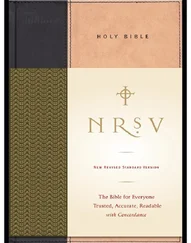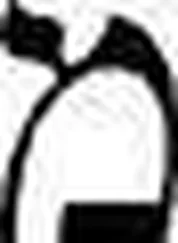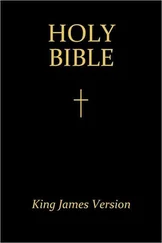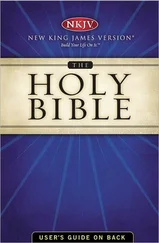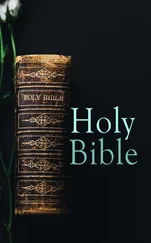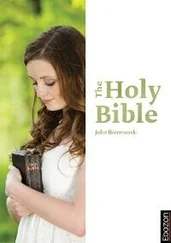Holy Bible, Authorized (King James) Version - NEW TESTAMENT
Здесь есть возможность читать онлайн «Holy Bible, Authorized (King James) Version - NEW TESTAMENT» весь текст электронной книги совершенно бесплатно (целиком полную версию без сокращений). В некоторых случаях можно слушать аудио, скачать через торрент в формате fb2 и присутствует краткое содержание. Жанр: Религия, на английском языке. Описание произведения, (предисловие) а так же отзывы посетителей доступны на портале библиотеки ЛибКат.
- Название:NEW TESTAMENT
- Автор:
- Жанр:
- Год:неизвестен
- ISBN:нет данных
- Рейтинг книги:5 / 5. Голосов: 1
-
Избранное:Добавить в избранное
- Отзывы:
-
Ваша оценка:
- 100
- 1
- 2
- 3
- 4
- 5
NEW TESTAMENT: краткое содержание, описание и аннотация
Предлагаем к чтению аннотацию, описание, краткое содержание или предисловие (зависит от того, что написал сам автор книги «NEW TESTAMENT»). Если вы не нашли необходимую информацию о книге — напишите в комментариях, мы постараемся отыскать её.
was authorized by King James I and is sometimes referred to as the “Authorized Version”. It was translated by the Church of England and was first published in.
NEW TESTAMENT — читать онлайн бесплатно полную книгу (весь текст) целиком
Ниже представлен текст книги, разбитый по страницам. Система сохранения места последней прочитанной страницы, позволяет с удобством читать онлайн бесплатно книгу «NEW TESTAMENT», без необходимости каждый раз заново искать на чём Вы остановились. Поставьте закладку, и сможете в любой момент перейти на страницу, на которой закончили чтение.
Интервал:
Закладка:
Book of Matthew
Although the first Gospel is anonymous, the early church fathers were unanimous in holding that Matthew, one of the 12 apostles, was its author. However, the results of modern critical studies -- in particular those that stress Matthew's alleged dependence on Mark for a substantial part of his Gospel -- have caused some Biblical scholars to abandon Matthean authorship. Why, they ask, would Matthew, an eyewitness to the events of our Lord's life, depend so heavily on Mark's account? The best answer seems to be that he agreed with it and wanted to show that the apostolic testimony to Christ was not divided.
Matthew, whose name means "gift of the Lord," was a tax collector who left his work to follow Jesus (9:9-13). In Mark and Luke he is called by his other name, Levi.
Some have argued on the basis of its Jewish characteristics that Matthew's Gospel was written in the early church period, possibly the early part of a.d. 50, when the church was largely Jewish and the gospel was preached to Jews only (Ac 11:19). However, those who have concluded that both Matthew and Luke drew extensively from Mark's Gospel date it later -- after the Gospel of Mark had been in circulation for a period of time. See essay and chart, p. 1943. Accordingly, some feel that Matthew would have been written in the late 50s or in the 60s. Others, who assume that Mark was written between 65 and 70, place Matthew in the 70s or even later. However, there is insufficient evidence to be dogmatic about either view.
The Jewish nature of Matthew's Gospel may suggest that it was written in the Holy Land, though many think it may have originated in Syrian Antioch.
Since his Gospel was written in Greek, Matthew's readers were obviously Greek-speaking. They also seem to have been Jews. Many elements point to Jewish readership: Matthew's concern with fulfillment of the OT (he has more quotations from and allusions to the OT than any other NT author); his tracing of Jesus' descent from Abraham (1:1-17); his lack of explanation of Jewish customs (especially in contrast to Mark); his use of Jewish terminology (e.g., "kingdom of heaven," where "heaven" reveals the Jewish reverential reluctance to use the name of God; see note on 3:2); his emphasis on Jesus' role as "Son of David" (1:1; 9:27; 12:23; 15:22; 20:30-31; 21:9,15; 22:41-45). This does not mean, however, that Matthew restricts his Gospel to Jews. He records the coming of the Magi (non-Jews) to worship the infant Jesus (2:1-12), as well as Jesus' statement that the "field is the world" (13:38). He also gives a full statement of the Great Commission (28:18-20). These passages show that, although Matthew's Gospel is Jewish, it has a universal outlook.
Matthew's main purpose is to prove to his Jewish readers that Jesus is their Messiah. He does this primarily by showing how Jesus in his life and ministry fulfilled the OT Scriptures. Although all the Gospel writers quote the OT, Matthew includes nine proof texts unique to his Gospel (1:22-23; 2:15; 2:17-18; 2:23; 4:14-16; 8:17; 12:17-21; 13:35; 27:9-10) to drive home his basic theme: Jesus is the fulfillment of the OT predictions of the Messiah. Matthew even finds the history of God's people in the OT recapitulated in some aspects of Jesus' life (see, e.g., his quotation of Hos 11:1 in 2:15). To accomplish his purpose Matthew also emphasizes Jesus' Davidic lineage (see Recipients, p. 1945).
The way the material is arranged reveals an artistic touch. The whole Gospel is woven around five great discourses: (1) chs. 5-7; (2) ch. 10; (3) ch. 13; (4) ch. 18; (5) chs. 24-25. That this is deliberate is clear from the refrain that concludes each discourse: "When Jesus had finished saying these things," or similar words (7:28; 11:1; 13:53; 19:1; 26:1). The narrative sections, in each case, appropriately lead up to the discourses. The Gospel has a fitting prologue (chs. 1-2) and a challenging epilogue (28:16-20).
The fivefold division may suggest that Matthew has modeled his book on the structure of the Pentateuch (the first five books of the OT). He may also be presenting the gospel as a new Torah and Jesus as a new and greater Moses.
The Birth and Early Years of Jesus (chs. 1-2)
His Genealogy (1:1-17)
His Birth (1:18 -- 2:12)
His Sojourn in Egypt (2:13-23)
The Beginnings of Jesus' Ministry (3:1 -- 4:11)
His Forerunner (3:1-12)
His Baptism (3:13-17)
His Temptation (4:1-11)
Jesus' Ministry in Galilee (4:12 -- 14:12)
The Beginning of the Galilean Campaign (4:12-25)
The Sermon on the Mount (chs. 5-7)
A Collection of Miracles (chs. 8-9)
The Commissioning of the 12 Apostles (ch. 10)
Ministry throughout Galilee (chs. 11-12)
The Parables of the Kingdom (ch. 13)
Herod's Reaction to Jesus' Ministry (14:1-12)
Jesus' Withdrawals from Galilee (14:13 -- 17:20)
To the Eastern Shore of the Sea of Galilee (14:13 -- 15:20)
To Phoenicia (15:21-28)
To the Decapolis (15:29 -- 16:12)
To Caesarea Philippi (16:13 -- 17:20)
Jesus' Last Ministry in Galilee (17:22 -- 18:35)
Prediction of Jesus' Death (17:22-23)
Temple Tax (17:24-27)
Discourse on Life in the Kingdom (ch. 18)
Jesus' Ministry in Judea and Perea (chs. 19-20)
Teaching concerning Divorce (19:1-12)
Teaching concerning Little Children (19:13-15)
The Rich Young Man (19:16-30)
The Parable of the Workers in the Vineyard (20:1-16)
Prediction of Jesus' Death (20:17-19)
A Mother's Request (20:20-28)
Restoration of Sight at Jericho (20:29-34)
Passion Week (chs. 21-27)
The Entry of Jesus into Jerusalem as King (21:1-11)
The Cleansing of the Temple (21:12-17)
The Last Controversies with the Jewish Leaders (21:18 -- 23:39)
The Olivet Discourse (chs. 24-25)
The Anointing of Jesus' Feet (26:1-13)
The Arrest, Trials and Death of Jesus (26:14 -- 27:66)
The Resurrection (ch. 28)
The Earthquake and the Angel's Announcement (28:1-7)
Jesus' Encounter with the Women (28:8-10)
The Guards' Report and the Jewish Elders' Bribe (28:11-15)
The Great Commission (28:16-20)
Mat1:1 The book of the generation of Jesus Christ, the son of David, the son of Abraham.
Mat1:2 Abraham begat Isaac; and Isaac begat Jacob; and Jacob begat Judas and his brethren;
Mat1:3 And Judas begat Phares and Zara of Thamar; and Phares begat Esrom; and Esrom begat Aram;
Mat1:4 And Aram begat Aminadab; and Aminadab begat Naasson; and Naasson begat Salmon;
Mat1:5 And Salmon begat Booz of Rachab; and Booz begat Obed of Ruth; and Obed begat Jesse;
Mat1:6 And Jesse begat David the king; and David the king begat Solomon of her that had been the wife of Urias;
Mat1:7 And Solomon begat Roboam; and Roboam begat Abia; and Abia begat Asa;
Mat1:8 And Asa begat Josaphat; and Josaphat begat Joram; and Joram begat Ozias;
Mat1:9 And Ozias begat Joatham; and Joatham begat Achaz; and Achaz begat Ezekias;
Mat1:10 And Ezekias begat Manasses; and Manasses begat Amon; and Amon begat Josias;
Mat1:11 And Josias begat Jechonias and his brethren, about the time they were carried away to Babylon:
Mat1:12 And after they were brought to Babylon, Jechonias begat Salathiel; and Salathiel begat Zorobabel;
Mat1:13 And Zorobabel begat Abiud; and Abiud begat Eliakim; and Eliakim begat Azor;
Mat1:14 And Azor begat Sadoc; and Sadoc begat Achim; and Achim begat Eliud;
Mat1:15 And Eliud begat Eleazar; and Eleazar begat Matthan; and Matthan begat Jacob;
Mat1:16 And Jacob begat Joseph the husband of Mary, of whom was born Jesus, who is called Christ.
Читать дальшеИнтервал:
Закладка:
Похожие книги на «NEW TESTAMENT»
Представляем Вашему вниманию похожие книги на «NEW TESTAMENT» списком для выбора. Мы отобрали схожую по названию и смыслу литературу в надежде предоставить читателям больше вариантов отыскать новые, интересные, ещё непрочитанные произведения.
Обсуждение, отзывы о книге «NEW TESTAMENT» и просто собственные мнения читателей. Оставьте ваши комментарии, напишите, что Вы думаете о произведении, его смысле или главных героях. Укажите что конкретно понравилось, а что нет, и почему Вы так считаете.

